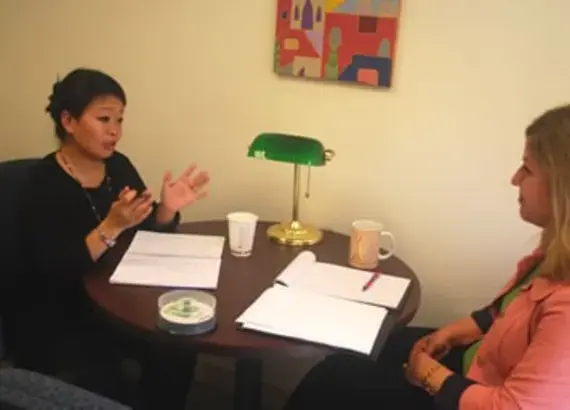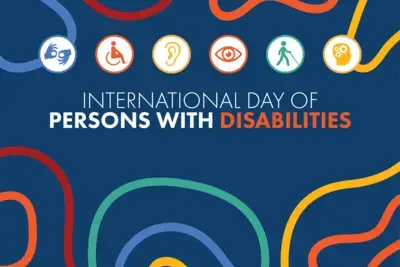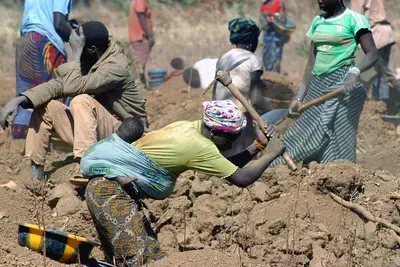
Success Story
NDI Nepal Staff Member Looks for Lessons for Women’s Caucus in DC Fellowship
Working at NDI wasn’t the most natural fit at first for Sushmita Subba Manandhar. When she began working as an office assistant at 26 for NDI in her native Nepal in 1999, she had little interest in the Institute’s programs with political parties or civic organizations.
“I still remember our first director asked me if I was interested in politics,” Manandhar recalled. “I said, ‘No, that is the last thing that I will do in my life.’”
But as she attended NDI events in Nepal to assist with logistics, she also listened to the discussions among high-level ministers, politicians and active citizens, and the topics piqued her interest.
“I saw these people from my country that had changed everything, so somehow I got very much interested in politics,” Manandhar said. “I talked to the NDI Nepal director and told him that if it was possible I would like to work with the programs also. I had learned so much about the politics in my country, so I wanted to change my career and go to work with civil society.”
Manandhar began working with NDI Nepal’s political programming in 2005. She quickly contributed to innovative programming for the Institute, including the establishment of the Civil Society Alliance for Political Reform, an organization of five leading nongovernmental organizations that worked to assess, advocate for and report on political and electoral reform initiatives conducted by political parties and government. Since 2009, Manandhar has managed NDI’s programming with the Inter Party Women's Alliance (IPWA).
It is her work with the IPWA – a group of women political leaders who advocate for equal representation for women in the government and political parties – that has now brought her to Washington, D.C. Manandhar earned the Andi Parhamovich Fellowship and for three months she will research NDI’s work around the world with women’s caucuses and the U.S. Congressional Caucus for Women’s Issues.
NDI Resident Deputy Director Discusses Women's New Political Roles in Nepal

NDI has worked in Nepal since 1994 to strengthen citizen engagement in the political process. The Institute has pursued this goal through civic education programs, opinion polling, assistance to domestic election monitoring organizations and training political party leaders on organization and leadership skills.
More recently, NDI has been working with political party activists and women parliamentarians to enhance their political skills and their ability to deliver services. Constituent assembly elections held in Nepal in 2008 ushered in a new era for the country and especially for women politicians. The constituent assembly, which is charged with drafting a new constitution and serves as the country's legislative body until a new constitution is ratified, has one-third of its seats reserved for women.
Jay Nishaant, NDI Nepal's resident deputy director, discusses the Institute's work in Nepal, particularly its Women's Leadership Academy that trains women MPs and a new television talk show for women and by women.
Manandhar is the second recipient of the Andi Parhamovich Fellowship, an award created by NDI in 2008 to honor Andi Parhamovich, an NDI staff member who was killed in Iraq in 2007. The Fellowship is awarded annually to a woman from one of NDI’s country offices or partner organizations who is deeply involved in strengthening democracy and is committed to increasing women’s political participation. The Andi Foundation, a non-profit organization founded by Andi’s family and friends, helps in the selection process. The Fellowship recognizes that women, who are often working in challenging and sometimes dangerous environments, are struggling against tremendous odds to end conflict and offer alternatives to political extremes.
During the Fellowship, the recipient has the opportunity to complete an individual project and attend training and conferences related to her professional and personal goals. Manandhar is spending the first month of the three-month fellowship researching at NDI before she transitions to the U.S. Congress in the second month and then in the final month to creating research materials and manuals for use in NDI Nepal programs.
Manandhar said she wants to learn how different caucuses are structured and how their roles and responsibilities are assigned. But she also looks forward to talking to caucus members about how they have overcome challenges common to all women. Many women are pursuing political careers while managing their households as primary caretakers, a balancing act Manandhar knows well with a husband and daughter of her own. She said the biggest struggle for members of the IPWA is to get their voices heard, and she thinks lessons learned in the United States and elsewhere can help them.
For example, Manandhar met with a member of NDI Iraq’s field staff, who was also temporarily working out of the Washington office, about the Institute’s work with The National Platform for Women in Iraq.
“The two countries differ,” Manandhar said of Iraq and Nepal, “but there are some elements there I could adopt in my own country also.” She said the IPWA has had great successes, such as advocating for a law banning domestic violence against women that was passed by the Constituent Assembly – the body elected in 2008 to draft a new constitution and serve as the interim parliament. But Nepal has a ways to go in implementing the law. The IPWA plans to help by strengthening women’s voices and numbers in the parliament.
Pictured Above: Sushmita Subba Manandhar (left) meets with Katie Croake, a member of NDI’s Middle East and North Africa team.
Published March 29, 2010



